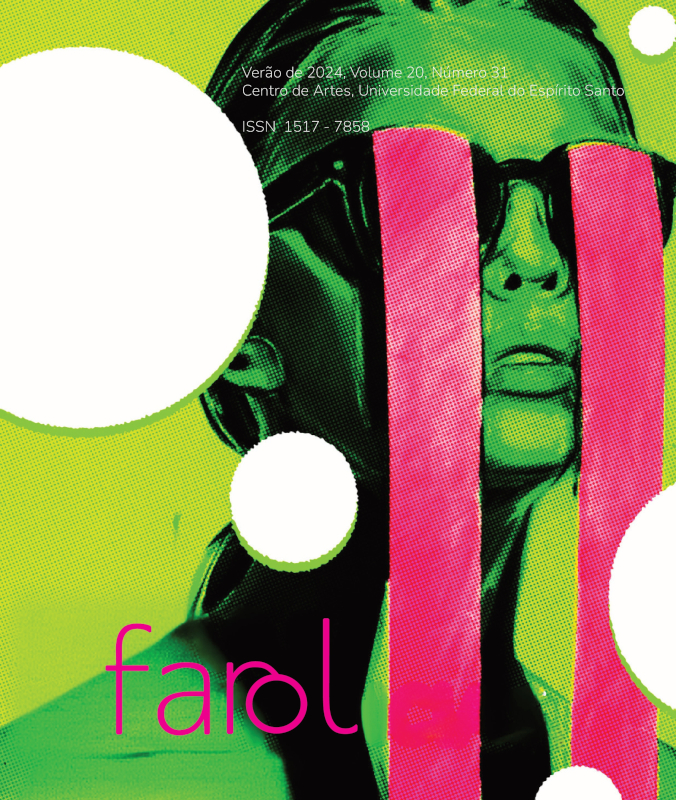Recife Frío
el Antropoceno a la luz de una película brasileña contemporánea
DOI:
https://doi.org/10.47456/rf.v20i31.46220Palabras clave:
Recife Frio, antropoceno, cinema brasileiro, crise ecológicaResumen
Este artículo tiene como objetivo analizar la película brasileña “Recife Frio”, de Kleber Mendonça Filho, desde la perspectiva del cambio climático y sus implicaciones socioambientales. Estructurado como un simulacro de documental, el cortometraje invierte la temperatura de la capital de Pernambuco, provocando transformaciones radicales en la sociabilidad de la población local. A través de una narrativa que mezcla sátira y reflexión, la película aborda temas pertinentes al Antropoceno, como la crisis ecológica y el apartheid ambiental, destacando las desigualdades acentuadas por el cambio climático.
Referencias
ANGUS, Ian. O apartheid ambiental é a norma no Antropoceno - Entrevista com Ian Angus. Revista IHU on-line, São Leopoldo, 17 mai. 2020. Disponível em: http://www.ihu.unisinos.br/78-noticias/599026-o-apartheid-ambiental-e-a-norma-no-antropoceno-entrevista-com-ian-angus. Acesso em: 20 set. 2024.
FERDINAND, Malcom. Uma ecologia decolonial: pensar a partir do mundo caribenho. São Paulo: Ubu Editora, 2022.
FOUCAULT, Michel. As palavras e as coisas – uma arqueologia das ciências humanas. Tradução de Salma Tannus Muchail. São Paulo: Martins Fontes, 2007.
GUATTARI, Félix. As três ecologias. Tradução de Maria Cristina F. Bittencourt. São Paulo: Ed. Papirus, 1990.
HARAWAY, Donna. Antropoceno, Capitaloceno, Plantationoceno, Chthuluceno: fazendo parentes. Climacom, ano 3, n. 5, 2016. Disponível em: http://climacom.mudancasclimaticas.net.br/?p=5258. Acesso em: 20 set. 2024.
HARAWAY, Donna. The Companion Species Manifesto - Dogs, People, and Significant. Chicago: Prickly Paradigm Press, 2003.
MIRZOEFF, Nicholas. Não é o Antropoceno, é a cena da supremacia branca ou a linha divisória geológica da cor. Buala, 2017. Disponível em: http://www.buala.org/pt/a-ler/nao- e-o-antropoceno-e-a-cena-da-supremacia-branca-ou-a-linha-divisoria-geologica-da-cor. Acesso em: 20 set. 2024.
MOORE, Jason (org.). Anthropocene or Capitalocene - Nature, History, and the Crisis of Capitalism. Oakland: PM Press, 2016.
MORTON, Timothy. The Ecological Thought. Cambridge: Harvard University Press, 2010.
NOVACEK, Michael J. Terra: Our 100-Million-Year-Old Ecosystem - and the Threats That Now Put It at Risk. New York: Farrar, Straus and Giroux, 2007.
SUPPIA, Alfredo. Respira fundo e prende: um pequeno raio-X da ecodistopia no cinema brasileiro, do regime militar aos militares no regime. Revista Eco-Pós (online), Rio de Janeiro, v. 23, p. 188-216, 2020.
Descargas
Publicado
Número
Sección
Licencia
Derechos de autor 2024 Lucas Murari

Esta obra está bajo una licencia internacional Creative Commons Atribución-NoComercial-CompartirIgual 4.0.
Los autores de los trabajos enviados a Revista Farol autorizan su publicación en soporte físico y electrónico, únicamente con fines académicos, y podrán ser reproducidos siempre que se cite la fuente. Dan fe de su originalidad, autoría y originalidad.





